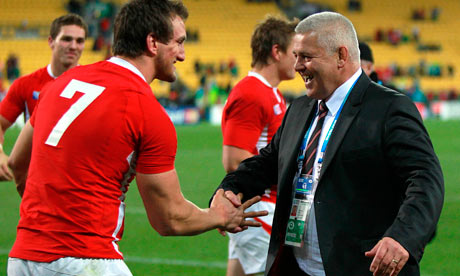
The first thing to question is how a side who less than six months earlier won the Six Nations and had come within a game of a Grand Slam could, at the World Cup, slip to the levels portrayed in Tuesday's leaked reports.
The first reaction is disbelief; that all three parties, players, clubs and the Rugby Football Union, have their vested interests and that they have been allowed to colour the evidence. That could be true, especially where players are allowed to give evidence with a guarantee of anonymity. My guess is that most courts would say the value of anyone's word depends to a large extent on who is giving it.
However, taken at face value and allowing for understandable selectivity in the reporting, the suggestion appears to be overwhelming; that long before England lost to France in the quarter-finals, they had lost the unity that any rugby squad has to have. Disputes between sections of the players and among members of the coaching staff over money and about the effectiveness of the backroom team are, if true, about as difficult a situation as it gets.
Above all other games, rugby depends on teamwork. If one of the 15 guys on the field is not pulling his weight, behaving like a cog in the machine, then the whole lot grinds to a halt. And you can extend that to include coaches, management, medics, analysts. There are bound to be disagreements in any party of 40-plus, but in a rugby squad, and particularly one going away for an extended period to a World Cup, there has to be a general feeling that you are all pulling together and going in the same direction.
I don't know what happened in the England camp because I wasn't there, and I don't intend second-guessing anyone. However, on the evidence being portrayed, it seems that the England situation was the mirror-opposite of what was going on with Wales. Whether that was luck or good management is for others to decide, but I like to think that the Welsh players were pointed in the right direction and then took over a lot of the driving themselves.
The Wales way is not the only way; there are a million ways of getting coaching wrong, just as there are a million ways of getting it right. Making it right for a specific team is the clever bit.
It's no great secret, because some of the key characters have written books about the last World Cup, but back in 2007 the England camp was split over training techniques – between the more traditional and the more game-orientated, shorter, sharper approach we had at Wasps. Reading the Times, there are clear suggestions that a similar lack of unanimity prevailed in New Zealand. Overlay a level of complaint that always arises when a team are not playing well, and you get a fertile breeding ground for many of the issues raised in the three reports.
Wales went the other way, but then again we as a coaching unit had been together a lot longer and had learned from the highs of the 2008 Grand Slam and the lows when we slipped off the standards we had set ourselves. However, through the high and lows, I would argue that Warren Gatland never lost sight of where he intended Wales to be by September 2011 or how we intended getting there.
We knew how we wanted to play and, learning from England's Clive Woodward in the run-up to 2003, Warren deliberately created a programme that regularly pitted us against South Africa, Australia and New Zealand so we knew what to expect from the best and how our game stacked up against them.
Then, this time borrowing from his time at Wasps, when we picked up on an idea that came from Ireland, Warren scheduled two intensive camps in Poland where cryotherapy recovery chambers set at minus 120C allowed the workload to be raised to quite brutal levels. Not only did that give a superb foundation to the squad's fitness levels, but just as important it did wonders for their collective mindset.
They bought into the work ethic. Not only bought into it but, led by some of the younger guys, ran with it, pulling more experienced guys along in their slipstream. Soon a non-drinking, or rather a non-binge-drinking culture developed (contrary to some stories, nobody objected to a glass of beer after a match) and Wales arrived in New Zealand very much a squad that was super fit and united in what we intended to do and how we intended doing it.

